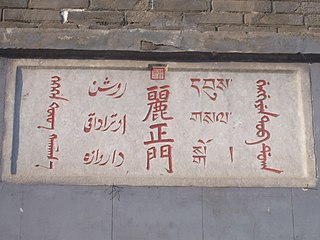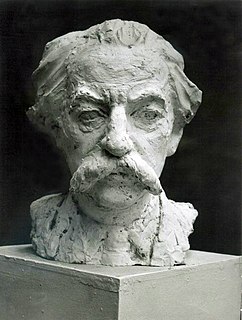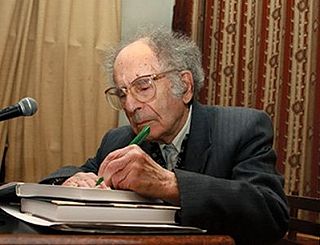Related Research Articles

The Soviet Union, officially known as the Union of Soviet Socialist Republics (USSR), was a federal sovereign state in northern Eurasia that existed from 1922 to 1991. Nominally a union of multiple national Soviet republics, in practice its government and economy were highly centralized. The country was a one-party state, governed by the Communist Party with Moscow as its capital in its largest republic, the Russian Soviet Federative Socialist Republic. Other major urban centers were Leningrad, Kiev, Minsk, Tashkent, Alma-Ata, and Novosibirsk. It spanned over 10,000 kilometers (6,200 mi) east to west across 11 time zones, and over 7,200 kilometers (4,500 mi) north to south. Its territory included much of Eastern Europe, as well as part of Northern Europe and all of Northern and Central Asia. It had five climate zones: tundra, taiga, steppes, desert and mountains.

Samizdat was a form of dissident activity across the Eastern Bloc in which individuals reproduced censored and underground publications by hand and passed the documents from reader to reader. This grassroots practice to evade official Soviet censorship was fraught with danger, as harsh punishments were meted out to people caught possessing or copying censored materials. Vladimir Bukovsky summarized it as follows: "Samizdat: I write it myself, edit it myself, censor it myself, publish it myself, distribute it myself, and spend time in prison for it myself."

Chagatai is an extinct Turkic language that was once widely spoken in Central Asia and remained the shared literary language there until the early 20th century. Literary Chagatai is the predecessor of the modern Karluk branch of Turkic languages, which includes Uzbek and Uyghur. Ali-Shir Nava'i was the greatest representative of Chagatai literature.

Mikhail Naumovich Epstein or Epshtein (Russian: Михаи́л Нау́мович Эпште́йн;, born 21 April 1950, is a Samuel Candler Dobbs Professor of Cultural Theory and Russian Literature at Emory University, Atlanta, US. He there moved from Moscow, USSR, in 1990. He has also worked as a Professor of Russian and Cultural Theory at Durham University, UK, from 2012 to 2015, where he was the founder and Director of the Centre for Humanities Innovation at Durham University.
Rootless cosmopolitan was a pejorative Soviet euphemism widely used during the anti-Semitic campaign of 1948–1953, which culminated in the "exposure" of the non-existent Doctors' plot. The term "rootless cosmopolitan" referred mostly to Jewish intellectuals, as an accusation of their lack of patriotism, i.e., lack of full allegiance to the Soviet Union. The campaign against "rootless cosmopolitans" began in 1946, when Joseph Stalin in his speech in Moscow attacked writers who were ethnic Jews. The expression was coined in the 19th century by Russian literary critic Vissarion Belinsky to describe writers who lacked Russian national character.

Yuri Mikhailovich Lotman was a prominent literary scholar, semiotician, and cultural historian, who worked at the University of Tartu. He was elected a member of the British (1977), Norwegian (1987), Royal Swedish (1989) and Estonian (1990) Academy of Sciences. He was a founder of the Tartu–Moscow Semiotic School. The number of his printed works exceeds 800 titles. His archive which includes his correspondence with a number of Russian and Western intellectuals, is immense.
Children of the Arbat is a novel by Anatoly Rybakov that recounts the era in the Soviet Union of the build-up to the Congress of the Victors, the early years of the second Five Year Plan and the (supposed) circumstances of the murder of Sergey Kirov prior to the beginning of the Great Purge. It is the first book of the tetralogy, followed by the books 1935 and Other Years, Fear and Dust and Ashes.
Vitali Vitaliev is a Ukrainian-born journalist and writer who has worked in Russia, the United Kingdom, Australia and Ireland.

Reading is a popular pastime in North Korea, where literacy and books enjoy a high cultural standing, elevated by the regime's efforts to disseminate propaganda as texts. Because of this, writers are held in high prestige.
New Sincerity is a trend in music, aesthetics, literary fiction, film criticism, poetry, literary criticism and philosophy that generally describes creative works that expand upon and break away from concepts of postmodernist irony and cynicism.

Valery Yakovlevich Tarsis was a Ukrainian writer, literary critic, and translator. He was highly critical of the communist regime.
Juliet R. V. Barker FRSL is an English historian, specialising in the Middle Ages and literary biography. She is the author of a number of well-regarded works on the Brontës, William Wordsworth, and medieval tournaments. From 1983 to 1989 she was the curator and librarian of the Bronte Parsonage Museum.
Valentin Ferdinandovich Asmus was a Russian philosopher. He was one of the small group who continued the classical European philosophical tradition through the early Soviet times. He was an independent thinker and unorthodox Marxist, with interests in the history of philosophy and aesthetics.

Colonel General Nikandr Evlampievich Chibisov was a Soviet military commander and Hero of the Soviet Union (1943).

Sergeant Savely Govorkov is a fictional character featuring in novels by Victor Dotsenko and others in the Soviet Union. A breakout character, Govorkov was created by Victor Dotsenko in the 1980s and by 1995 had featured in a number of novels by Dotsenko, making Dotsenko the most published and highest paid Russian writer. He appeared in more than twenty novels, all of them became a bestsellers. Other writers who have prominently featured the character in their works include Yuri Nikitin, Anton Pervushin, Valery Roschin, Kirill Vorobyev.

Grigory Solomonovich Pomerants was a Russian philosopher and cultural theorist. He is the author of numerous philosophical works that circulated in samizdat and made an impact on the liberal intelligentsia in the 1960s and 1970s.

Mark Sergeyevich Kharitonov is a Russian novelist, poet, essayist, and translator. He was awarded the first Russian Booker Prize in 1992 for his novel Lines of Fate.

The Shield and the Sword is a 1968 Soviet spy series with four parts directed by Vladimir Basov. It is based on a novel by Vadim Kozhevnikov, who was Secretary of the Soviet Writers' Union. It was a highly influential movie in the Soviet Union, inspiring many, Vladimir Putin for instance, to join the KGB.
Oktyabr is a monthly Russian literary magazine, based in Moscow. In addition to Novy Mir and Znamya the monthly is a leading and deep-rooted literary magazine in Russia.
Yulia Moiseevna Neiman, also known by the pen name Yu. Novikova, was a Russian Jewish poet, essayist, and translator.
References
- ↑ Marsh, Rosalind; Rosalind J. Marsh (2007). Literature, history and identity in post-Soviet Russia, 1991-2006. Peter Lang. p. 83. ISBN 978-3-03911-069-8 . Retrieved 30 May 2011.
- ↑ Barker, Adele Marie (1999). Consuming Russia: popular culture, sex, and society since Gorbachev . Duke University Press. pp. 167–168. ISBN 978-0-8223-2313-6 . Retrieved 30 May 2011.
- ↑ Barker (2007), p. 493.
- ↑ Bartlett, Rosamund; Anna Benn (13 December 2007). Literary Russia: a guide. Overlook Duckworth. p. xii. ISBN 978-0-7156-3622-0.
| This article about a Russian writer or poet is a stub. You can help Wikipedia by expanding it. |